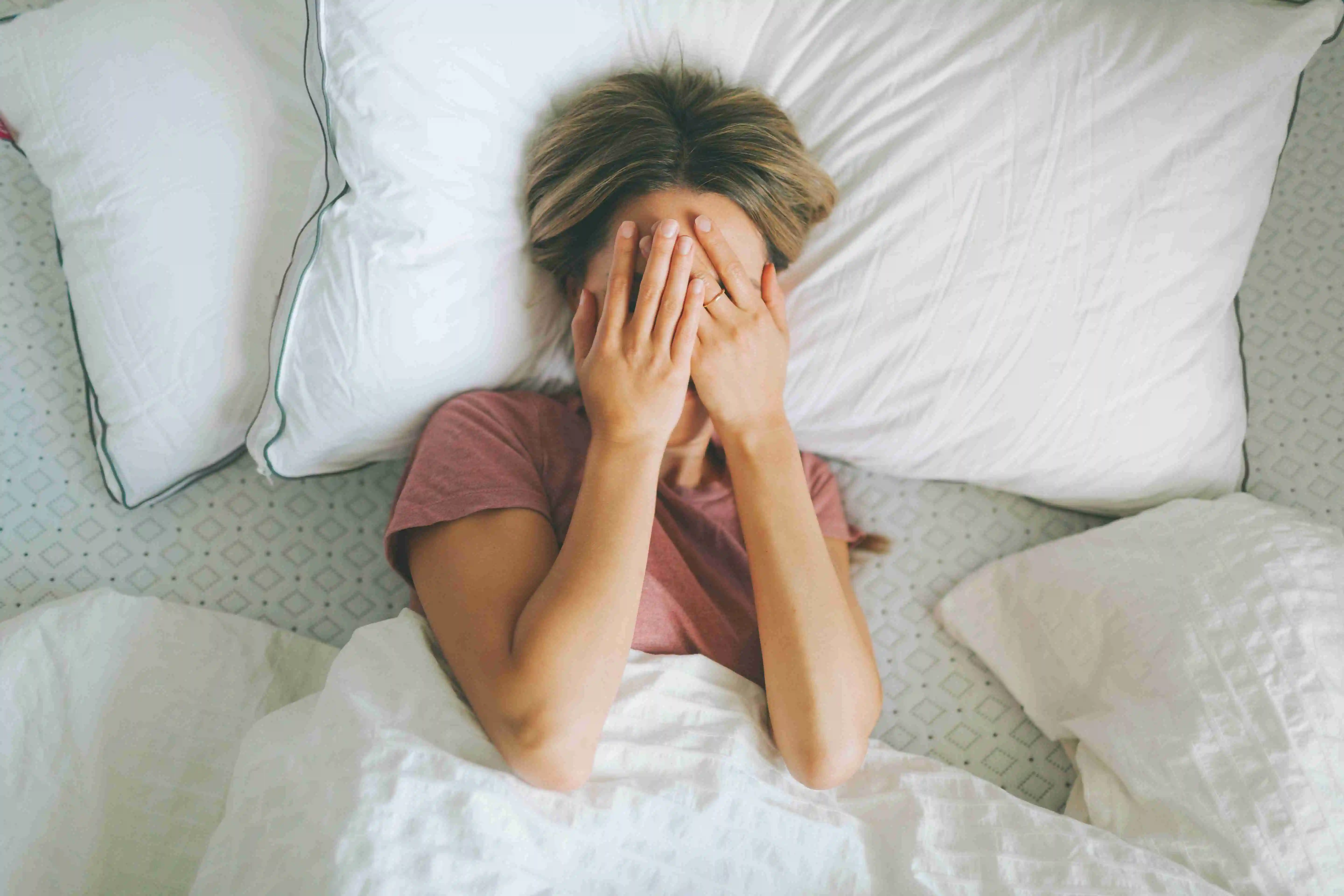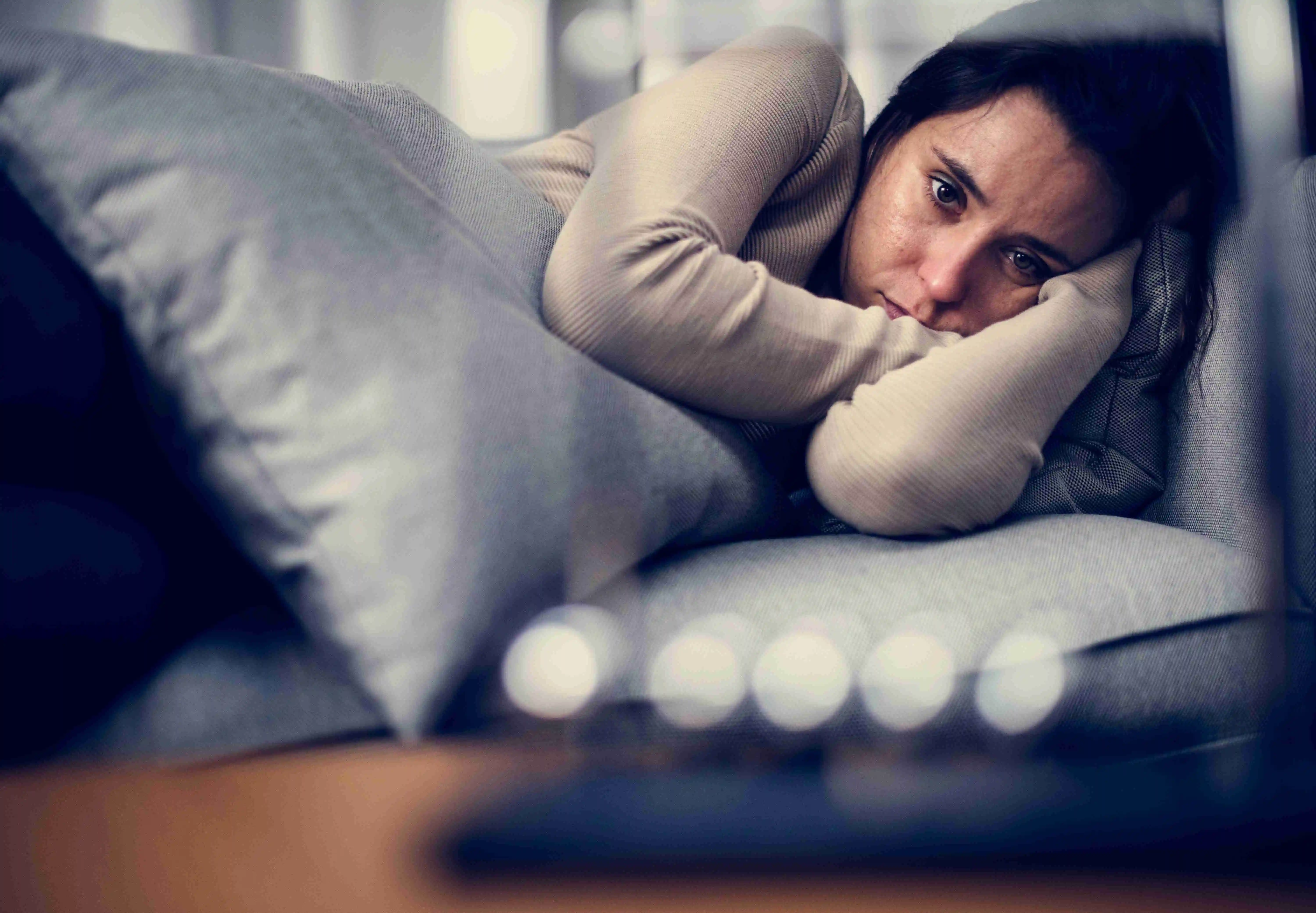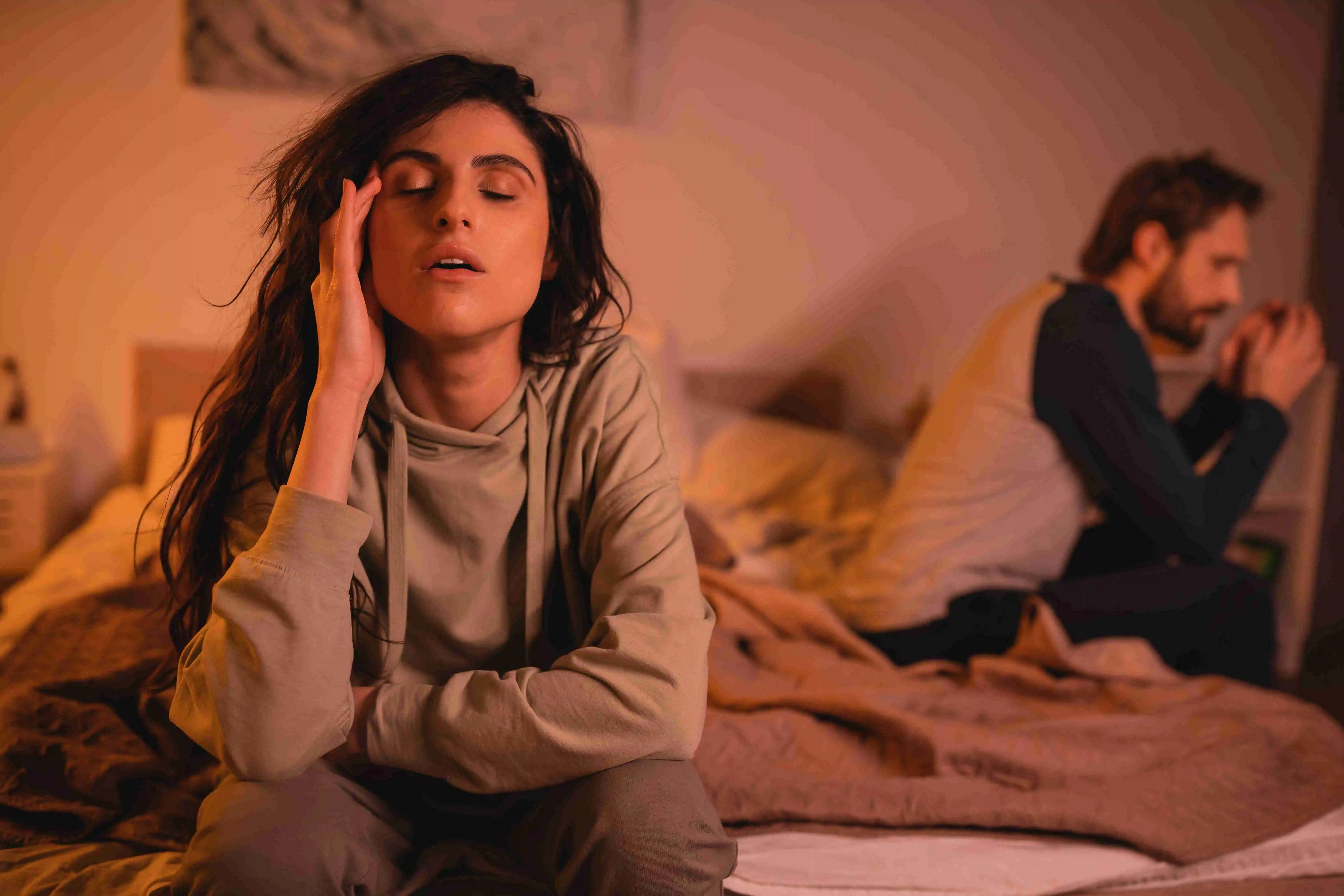Anxiety is a common mental health condition that affects millions of people worldwide. It is characterized by persistent feelings of worry, fear, and unease that can significantly impact one's daily life.
When it comes to sleep, anxiety can be a major contributing factor to various sleep disorders, including insomnia, sleep apnea, and restless leg syndrome. In this article, we dive deep into the connection between anxiety and your sleep health.
Anxiety Overview

Feelings of apprehension, worry, and unease are characteristics of anxiety, a typical and natural emotional response to stress.
There are several types of anxiety disorders, each with its distinct symptoms and manifestations. Generalized anxiety disorder (GAD) involves persistent and excessive worry; panic disorder is characterized by recurrent and unexpected panic attacks; and social anxiety disorder involves intense fear and avoidance of social situations.
Symptoms of anxiety can vary widely and may include rapid heartbeat, sweating, trembling, fatigue, difficulty concentrating, and sleep disturbances.
Anxiety Types and Symptoms
Anxiety can manifest in various forms, including generalized anxiety disorder (GAD), social anxiety disorder, panic disorder, specific phobias, and separation anxiety disorder.
- Generalized Anxiety Disorder (GAD): This type of anxiety is characterized by persistent and excessive worry about various areas of life, often accompanied by physical symptoms such as restlessness, irritability, muscle tension, and difficulty concentrating.
- Social Anxiety Disorder: This type of anxiety involves intense fear of social situations and scrutiny by others, leading to avoidance of social interactions and physical symptoms like blushing, sweating, trembling, and a rapid heart rate.
- Panic Disorder: This type of anxiety is marked by recurrent panic attacks, sudden episodes of intense fear or discomfort, and physical symptoms such as palpitations, sweating, trembling, shortness of breath, and feelings of impending doom.
- Separation Anxiety Disorder: Separation Anxiety Disorder is a condition that affects children mostly and is characterized by excessive anxiety about being separated from their caregivers, accompanied by fears of harm to themselves or their loved ones, nightmares, and physical distress.
Anxiety and Its Impact on Sleep
The connection between anxiety and sleep is a complex one. Anxiety can make it difficult to fall asleep, stay asleep, or experience quality, restorative sleep. Conversely, poor sleep can also exacerbate feelings of anxiety, creating a vicious cycle that can be challenging to break.
Understanding the relationship between anxiety and sleep is crucial in developing effective strategies to manage both conditions and improve overall well-being.
Common Sleep Disorders Associated with Anxiety

Anxiety and sleep disorders often go hand-in-hand. Individuals with anxiety may experience difficulty falling asleep, frequent waking during the night, or a general inability to achieve restful, restorative sleep. This can lead to a range of sleep disorders, including:
- Insomnia: Anxiety and insomnia include difficulty falling asleep, staying asleep, or waking up too early, often due to racing thoughts, worries, and hyperarousal associated with anxiety.
- Sleep Apnea: A sleep disorder characterized by repeated pauses in breathing during sleep, which can be exacerbated by the physical and emotional stress of anxiety.
- Restless Leg Syndrome (RLS): An irresistible urge to move the legs, often accompanied by uncomfortable sensations, which can be worsened by anxiety-induced muscle tension and hyperarousal.
- Nightmares and Night Terrors: Vivid ,distressing dreams or sudden awakenings with feelings of fear, often linked to the intrusive thoughts and emotional distress associated with anxiety. For more information on how dreams affect your sleep, click here.
Managing Sleep Disorders Related to Anxiety
Addressing anxiety is a crucial step in improving sleep quality. Here are some effective strategies to manage anxiety and promote better sleep:
- Practice Relaxation Techniques: Engage in activities like deep breathing exercises, yoga, progressive muscle relaxation, or meditation to calm the mind and body before bedtime.
- Limit Caffeine, Alcohol, and Screen Time: Avoid consuming stimulants like caffeine and limit alcohol intake, as they can disrupt sleep. Additionally, reduce exposure to blue light from electronic devices before bed.
- Establish a Consistent Sleep Routine: Maintain a regular sleep schedule, including consistent bedtimes and wake-up times, to regulate your body's internal clock.
- Cognitive-Behavioral Therapy (CBT): Work with a mental health professional to address negative thought patterns and develop coping strategies for managing anxiety.
- Seek Social Support: Surround yourself with a supportive network of family and friends, and consider joining a support group for individuals dealing with anxiety and sleep issues.
- Manage Stress: Engage in stress-reducing activities such as yoga, exercise, or journaling to help alleviate the physical and emotional symptoms of anxiety.
- Explore Medication Options: In some cases, your healthcare provider may recommend the use of prescription or over-the-counter medications to help manage anxiety and improve sleep.
Lifestyle Changes to Improve Sleep Quality

In addition to addressing anxiety, making lifestyle changes can also play a significant role in improving sleep quality. Consider the following:
- Establish a Relaxing Bedtime Routine: Engage in calming activities like reading, taking a warm bath, or practicing light stretching to signal to your body that it's time to wind down.
- Create a Sleep-Friendly Environment: Ensure your bedroom is dark, cool, and quiet, with minimal distractions and a comfortable mattress.
- Limit Daytime Napping: Avoid taking long or frequent naps during the day, as this can interfere with your body's natural sleep-wake cycle.
- Engage in Regular Exercise: Incorporate physical activity into your daily routine, as it can help reduce stress, improve mood, and promote better sleep.
- Manage Exposure to Light and Technology: Minimize exposure to blue light from electronic devices and ensure your bedroom is dark during sleep hours.
- Maintain a Healthy Diet: Eat a balanced, nutrient-rich diet that supports overall health and can help regulate sleep-wake cycles.
- Herbal Supplements: Herbs like chamomile, valerian root, and melatonin have been used to help reduce anxiety and improve sleep. Always consult with your healthcare provider before starting any new supplement regimen.
Managing Sleep Disorders Related to Anxiety
- Acupuncture and Traditional Chinese Medicine: Acupuncture and other traditional Chinese medicine practices, such as herbal remedies and Tai Chi, may help alleviate anxiety and promote better sleep.
- Massage Therapy: Regular massage sessions can help reduce muscle tension, promote relaxation, and improve sleep quality.
- Biofeedback: This technique uses electronic sensors to provide real-time feedback on physiological processes, such as heart rate and muscle tension, to help individuals learn to control their stress response.
- Cognitive-Behavioral Therapy for Insomnia (CBT-I): This specialized form of CBT focuses on addressing the cognitive and behavioral factors contributing to insomnia, and it can be particularly effective in managing anxiety-related sleep issues.
- Dietary Considerations: Consume a balanced, nutrient-rich diet that includes whole grains, lean proteins, fruits, and vegetables. Limit your intake of caffeine, alcohol, and processed foods, as they can disrupt sleep and exacerbate anxiety. Incorporate foods that are rich in tryptophan, such as turkey, eggs, and nuts, as they can help promote the production of serotonin and melatonin, hormones that regulate sleep.
- Exercise and Physical Activity: Regular physical activity, such as aerobic exercise, strength training, or yoga, can help reduce stress, improve mood, and promote better sleep. Consider incorporating relaxing activities, such as gentle stretching or walking, into your evening routine to help you wind down.
FAQs
How can I tell if my anxiety is affecting my sleep?
Some common signs that anxiety is affecting your sleep include difficulty falling asleep, frequent waking during the night, restless sleep, and feeling tired or fatigued during the day. Pay attention to any patterns or changes in your sleep quality that coincide with periods of increased anxiety.
What are the long-term effects of poor sleep and unmanaged anxiety?
Chronic poor sleep and unmanaged anxiety can have serious long-term consequences, such as an increased risk of physical health issues (e.g., high blood pressure, heart disease, diabetes) and mental health problems (e.g., depression, cognitive impairment). It's important to address both conditions in order to maintain overall well-being.
Are there any medications that can help with both anxiety and sleep?
Yes, you can treat both anxiety and sleep issues with some prescription medications, such as certain antidepressants or anti-anxiety drugs. However, it's crucial to work closely with your healthcare provider to determine the best course of treatment, as medication can have side effects and may not be suitable for everyone.
With lifestyle changes, how long does it typically take to see improvements in anxiety and sleep?
The timeline for seeing improvements can vary, as everyone responds differently. However, many people report noticing positive changes within a few weeks of consistently implementing lifestyle adjustments, such as a regular sleep routine, stress management techniques, and dietary/exercise modifications. Patience and persistence are key when addressing these complex issues.
Conclusion
Addressing both anxiety and sleep issues is critical for overall well-being because they are closely intertwined. By understanding the connection between these two factors and implementing a comprehensive approach, you can take steps towards achieving better sleep and reducing the impact of anxiety in your life.
Kelsey Butler, MS, RDN
Kelsey Butler is a Registered Dietitian Nutritionist with a Master's in Nutrition Sciences. She is an expert in nutrition research, coaching, and content development. Kelsey takes a mindful approach toward health and values building relationships with all foods. She understands the need to set personalized goals because not one size fits all, from dietary preferences to lifestyle habits.


